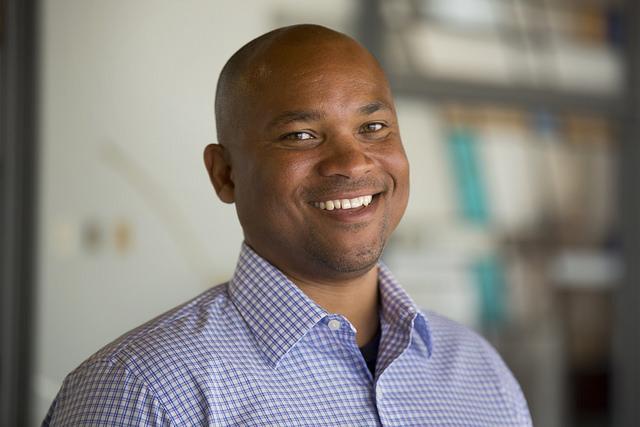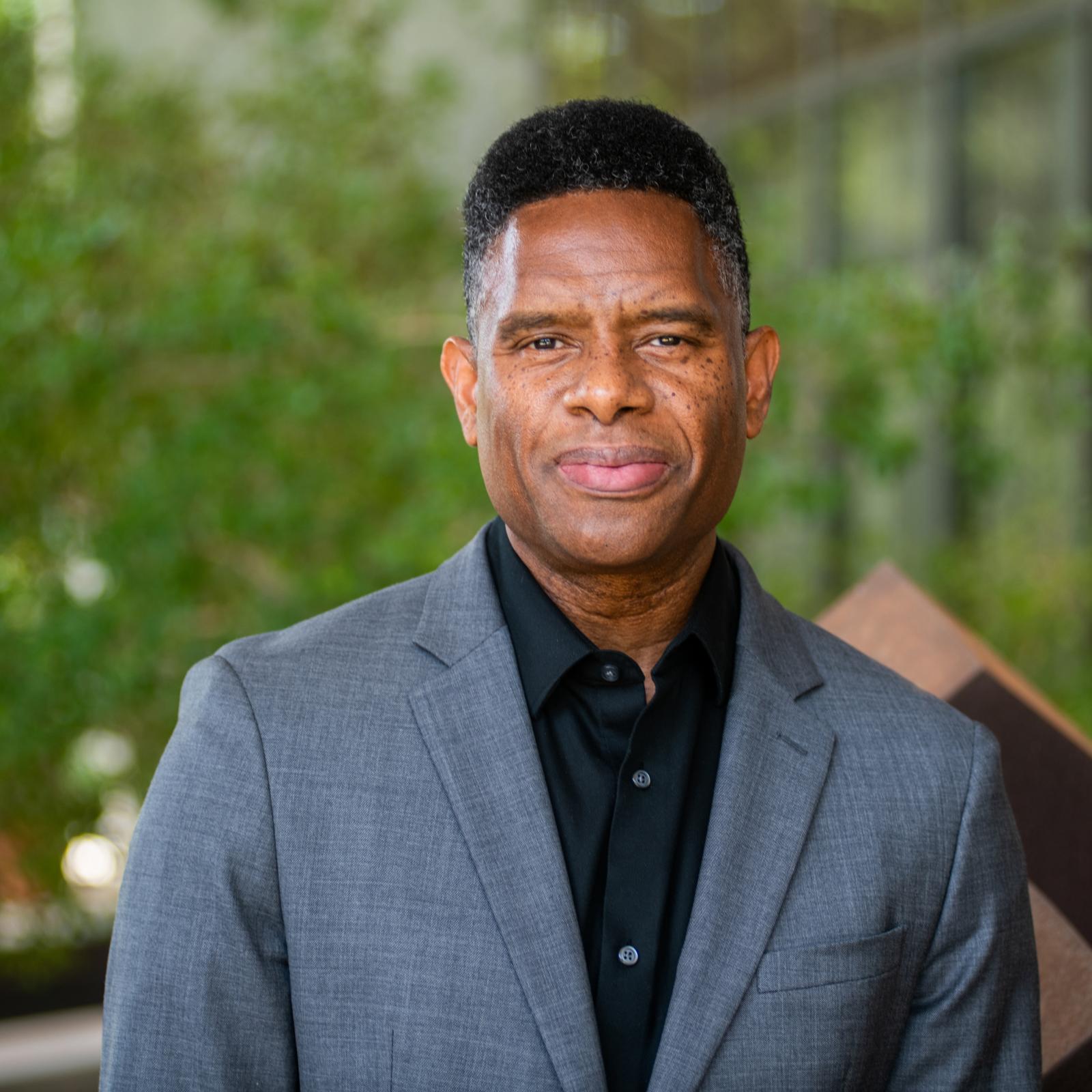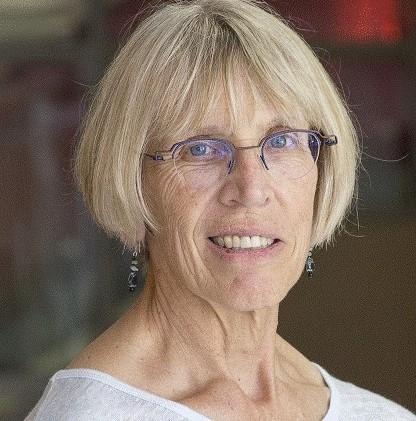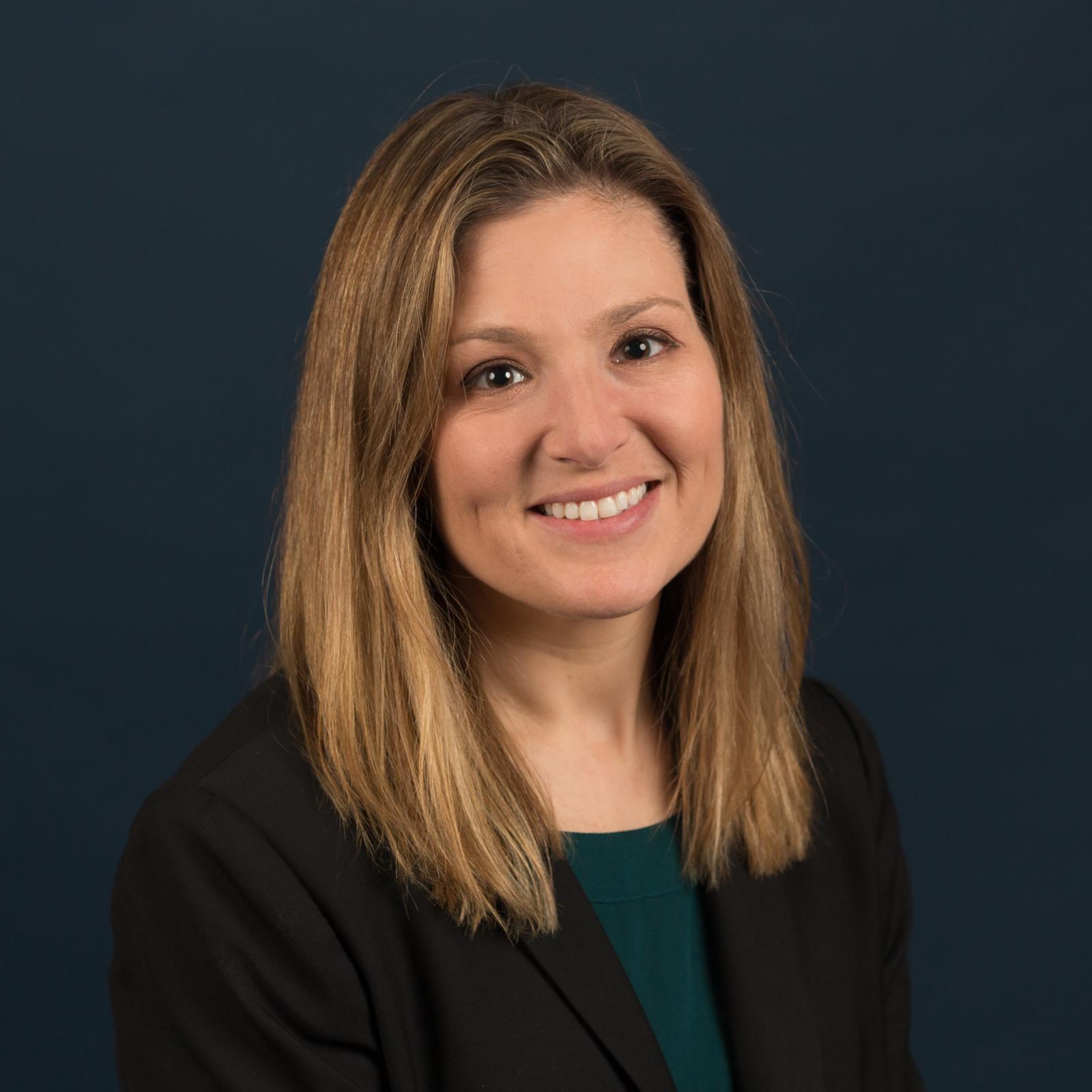
Keynote Speaker

Chad Jenkins
Associate Chair of Undergraduate Studies and Professor of Robotics
University of Michigan
Read Bio
Odest Chadwicke Jenkins, Ph.D., is a Professor of Robotics at the University of Michigan. Prof. Jenkins earned his B.S. in Computer Science and Mathematics at Alma College (1996), M.S. in Computer Science at Georgia Tech (1998), and Ph.D. in Computer Science at the University of Southern California (2003). He previously served on the faculty of Brown University in Computer Science (2004-15). His research addresses problems in interactive robotics and human-robot interaction, primarily focused on mobile manipulation, robot perception, and robot learning from demonstration. His research often intersects topics in computer vision, machine learning, and computer animation. Prof. Jenkins has been recognized as a Sloan Research Fellow and is a recipient of the Presidential Early Career Award for Scientists and Engineers (PECASE). His work has also been supported by Young Investigator awards from the Office of Naval Research (ONR), the Air Force Office of Scientific Research (AFOSR) and the National Science Foundation (NSF). Prof. Jenkins is currently serving as Editor-in-Chief for the ACM Transactions on Human-Robot Interaction. He is a Fellow of the American Association for the Advancement of Science and Association for the Advancement of Artificial Intelligence, and Senior Member of the Association for Computing Machinery and the Institute of Electrical and Electronics Engineers. He is an alumnus of the Defense Science Study Group (2018-19).
Panelists
International Perspectives Panel: Global Collaboration to Fuel Ethical Innovation

Christine Custis
Director of Programs and Research
Partnership on AI
Read Bio
Dr. Christine Custis is the Director of Programs and Research at the Partnership on AI where her work focuses on managing PAI’s portfolio of research and programs, ensuring coordination of program pilots and outputs, and delivering measurable results that align with our theory of change. This includes holding timely convenings on emerging international challenges; conducting research, synthesis, and analysis to develop accessible resources, tools, and recommendations on specific areas of programming for PAI; and, promoting adoption of best practices with Partners. She engages collaboratively and consultatively with our global community of Partners, PAI’s Board of Directors and individuals across PAI’s internal organization.
Dr. Custis is also an associate professor at Shenandoah University in the School of Business where she teaches and conducts research on how enterprises should use information systems and technology to innovate and achieve organizational goals. Her distinguished career includes over 20 years of experience with strategy, project management, and enterprise architecture. This has resulted in a plethora of technical publications and awards. She earned a B.S. in Computer Information Systems from Florida A&M, an M.S. in Computer Science from Howard University, and a Ph.D. in Business Administration from Morgan State University.

Kate Devlin
Director of Advocacy and Engagement and Reader in Artificial Intelligence & Society
UKRI Trustworthy Autonomous Systems (TAS) Hub
Read Bio
Dr. Kate Devlin is the Director of Advocacy and Engagement at the UKRI Trustworthy Autonomous Systems (TAS) Hub - a collaborative platform to enable the development of socially beneficial robotics and AI systems that are both trustworthy in principle and trusted in practice - and a Reader in Artificial Intelligence & Society in the Department of Digital Humanities, King's College London, UK. With an undergraduate degree in archaeology and an MSc and PhD in computer science, her research investigates how people interact with and react to technologies, both past and future. Dr. Devlin is the author of the critically acclaimed Turned On: Science, Sex and Robots (Bloomsbury, 2018), which examines the ethical and social implications of technology and intimacy. Dr. Devlin is a board member of the Open Rights Group, a UK-based organization that works to preserve digital rights and freedoms, and is a campaigner for gender equality to improve opportunities for women in tech. In 2022, she was appointed as a patron of Humanists UK for her contribution to the greater public understanding of science.

Kay Firth-Butterfield
Head of Artificial Intelligence and Member of Executive Committee
World Economic Forum
Read Bio
Kay Firth-Butterfield is Head of Artificial Intelligence and a member of the Executive Committee at the World Economic Forum and is one of the foremost experts in the world on the governance of AI. She is a Barrister, former Judge and Professor, technologist, and entrepreneur who has an abiding interest in how humanity can equitably benefit from new technologies, especially AI. Firth-Butterfield is an Associate Barrister (Doughty Street Chambers), Master of the Inner Temple, London and served on the Lord Chief Justice’s Advisory Panel on AI and Law. She co-founded the Responsible AI Institute and was the world’s first Chief AI Ethics officer in 2014 and created the #AIEthics twitter hashtag.
Firth-Butterfield is Vice-Chair of The IEEE Global Initiative for Ethical Considerations in Artificial Intelligence and Autonomous Systems and was part of the group which met at Asilomar to create the Asilomar AI Ethical Principles. She is on the Polaris Council for the Government Accountability Office (USA), the Advisory Board for UNESCO International Research Centre on AI, EarthSpecies and AI4All. She has advanced degrees in Law and International Relations and regularly speaks to international audiences addressing many aspects of the beneficial and challenging technical, economic, and social changes arising from the use of AI. She is a co-chair of AEIS2023.
Using AI to Advance Racial Justice and Combat Disinformation

Maria De-Arteaga
Assistant Professor
Information, Risk and Operations Management, UT Austin
Read Bio
Dr. Maria De-Arteaga is an Assistant Professor at the Information, Risk and Operations Management Department at the University of Texas at Austin. She received a joint PhD in Machine Learning and Public Policy from Carnegie Mellon University. Her research focuses on the risks and opportunities of using machine learning for decision support in high-stakes settings. De-Arteaga's work has been awarded the Best Thematic Paper Award at NAACL’19, the Innovation Award on Data Science at Data for Policy’16, and has been featured by UN Women and Global Pulse in their report Gender Equality and Big Data: Making Gender Data Visible. She is a recipient of a 2020 Google Award for Inclusion Research, a 2018 Microsoft Research Dissertation Grant, and was named an EECS 2019 Rising Star. In 2017 she co-founded the Machine Learning for the Developing World (ML4D) Workshop series at NeurIPS. De-Arteaga is a collaborator on the Good Systems core research project, “Designing Responsible AI Technologies to Curb Disinformation.”

S. Craig Watkins
Ernest A. Sharpe Centennial Professor, School of Journalism and Media
Director, IC2 Institute
UT Austin
Read Bio
Dr. S. Craig Watkins is the Executive Director of the IC2 Institute and Ernest A. Sharpe Centennial Professor (Moody College of Communication) at the University of Texas at Austin. His research examines the digital and data divides, computer-mediated technologies and human behavior, and the social and ethical implications of artificial intelligence. Dr. Watkins is one of the Principal Investigators for UT Austin’s Good Systems Grand Challenge, a university-funded research initiative that examines the social, technical, and ethical implications of artificial intelligence, leading the “AI and the Future of Racial Justice” core research project. In his role as Executive Director of the IC2 Institute Dr. Watkins is leading a new initiative to innovate in the health equity space.

Meme Styles
Founder & President
MEASURE
Read Bio
In 2015, Meme Styles founded MEASURE to promote using evidence-based projects and tools to tell real-life stories behind the numbers. As a catalyst for systems changes, MEASURE has grown to a fully operational nonprofit social enterprise that provides free data support to Black and Brown-led organizations.
So far, the organization has provided thousands of free data support hours to Black and Brown-led organizations. They are also responsible for strategic partnerships with the University of Texas, Texas Southern University, and more to disrupt traditional research in exchange for BIPOC-led lived-experience protocols. Last year, Meme was named an MIT SOLVER for anti-racist technology in the United States and, for the next two years, has been awarded a fellowship by the Social Science Research Council.
Jameila "Meme" Styles was a past-Chairwoman of Miss Juneteenth, Austin Police Chief's Award of Excellence recipient, Austin 40 under 40 WINNER 2019, past-Chairwoman of African TV5 (AFTV5), and the Div Inc Nonprofit Leader of the Year for 2021.
Mrs. Styles holds a Bachelor of Science in Communications, Masters Of Public Administration with a concentration on National Security, and a Certificate in Diversity, Equity, and Inclusion from Cornell. Additionally, Mrs. Styles has been certified in Performance Measurement through George Washington University College of Professional Studies. Today, Mrs. Styles is pursuing a doctorate in Strategic Leadership from Liberty University. She is also the wife of a US Veteran and the mother of four.
AI and Surveillance in Smart Cities

Marc Coudert
Climate Resilience & Adaptation Manager
Office of Resilience, City of Austin
Read Bio
As an employee of the City of Austin Office of Resilience, Marc works with city departments to embed climate adaptation strategies into long-term operation and asset management planning. In this role, he also supports community organizers to increase climate resilience in the Eastern Crescent.

Dev Niyogi
Professor
Department of Geological Sciences, UT Austin
Read Bio
Dr. Niyogi has coauthored over 200 peer-reviewed papers for international journals, 18 book chapters, and over 150 conference proceedings or abstracts for professional conferences such as the AMS and AGU annual meetings. According to Google Scholar, his research has been cited over 19,000 times (h index = 70), and his work has been read over 122,000 times per Research Gate statistics. His work has been highlighted in various media outlets including in the popular press such as Yahoo!, MSNBC, Wired, CNN, LiveScience, National Geographic, Tedx Talk, NASA press releases. Dr. Niyogi's research is funded through a variety of competitive federal grants- NSF (Atmospheric and Geosciences, Hydrology, Cyberinfrastructure, Computer Sciences, Geoscience Education, International Programs, RAPID, and CAREER), NASA (Hydrology, Interdisciplinary Sciences), Joint Center for Satellite Data Assimilation, DOE, NOAA, and USDA/NIFA. He has developed over 30 successful research projects, which have led to a total award of more than $100 million to Purdue ($ 6 million as an individual share) through grants. At Purdue, Dr. Niyogi received Purdue Seeds for Success award, Million Dollar research award, and the University Faculty Scholar recognition, the NSF CAREER award, the USDA NIFA Partnership Award, and has been part of the 2018 Indiana Governor Award for Environmental Excellence- amongst other. At University of Texas at Austin, Dr. Niyogi is also part of the Theme Organizing Committee of the Planet Texas 2050, and part of the Good Systems core research project “A Good System for Smart Cities.”

Emily Woodward
Graduate Student
School of Journalism and Media, UT Austin
Read Bio
Emily Woodward is an M.A. candidate in the University of Texas at Austin’s School of Journalism and Media, and a graduate research assistant at the Technology & Information Policy Institute. At the Technology & Information Policy Institute, Woodward has conducted research on issues surrounding privacy, data policies and data governance, and civic engagement related to the use of public camera systems in U.S. cities. Prior to arriving at UT, Woodward spent several years working as a design researcher and strategist in Chicago and earned her BA from the University of Illinois at Urbana-Champaign. Woodward is a collaborator on the Good Systems core research project “Being Watched: Embedding Ethics in Public Cameras.”

Joe Faulk
Director of Technology
Austin Public Library
Read Bio
Joe Faulk is a technology leader that has spent his career leading implementations of innovative solutions to address business needs. He has over 35 years of experience in Technology, 24 of which he has served as the Director of Technology for the Austin Public Library. Joe has played a key role in the design and implementation of the library's technology infrastructure. His leadership was crucial in the development of the city's Central Library, which showcases the latest advancements in library technology.
Libraries today are immersed in digital content, data integration, and technology services that have transformed how information is provided to users. Joe recognizes the opportunities and responsibilities that come with integrating AI into library services, and he and his team are working towards a future that leverages the power of technology while maintaining the human touch that makes libraries special.
The Future of Work: Smart Tools and Human-Robot Partnerships

Joydeep Biswas
Assistant Professor
Department of Computer Science, UT Austin
Read Bio
Dr. Joydeep Biswas is an assistant professor of Computer Science at the UT Austin College of Natural Sciences. Dr. Biswas’ research areas include perception, planning, and failure recovery for autonomous mobile robots. These topics support his goal of having autonomous service mobile robots deployed on a campus to city scale, both indoors and outdoors, in real world human environments, performing assistive tasks accurately and robustly on demand, over deployments spanning years. He is most interested in tackling research problems that will directly improve long-term autonomy on real world robots deployed in human environments.
Prior to joining UT Austin, Dr. Biswas was an assistant professor in the College of Information and Computer Sciences at University of Massachusetts Amherst. He earned his PhD in Robotics from Carnegie Mellon University in 2014, and his B.Tech in Engineering Physics from the Indian Institute of Technology Bombay in 2008. Dr. Biswas is a collaborator on the Good Systems core research project “Living and Working with Robots.”

Josh Harguess
Department Manager of AI Security and Perception
Autonomy Innovation Center, MITRE Labs
Read Bio
Dr. Josh Harguess is the Department Manager of AI Security and Perception in the AI and Autonomy Innovation Center at MITRE Labs. He joined MITRE in 2020 to continue performing research and advising sponsors, partners, and staff in applications of computer vision and machine learning to real-world problems. Before MITRE, he spent 1 year at Shield AI performing applied research on computer vision for a quadrotor platform and 7 years at Naval Information Warfare Center (NIWC) Pacific applying computer vision and machine learning research to Navy and DoD problems. He received his Ph.D. from The University of Texas at Austin in 2011. He is an active researcher in these areas with 60+ publications, 3 best paper awards, and 5 patents. He is also the founder of the Naval Applications of Machine Learning annual workshop, a past General Chair and Program Chair of IEEE AIPR and SPIE DCS, and an active Area Chair, member, and volunteer for IEEE WACV and CVPR.

Kenneth R. Fleischmann
Professor
School of Information, UT Austin
Read Bio
Kenneth R. Fleischmann, Ph.D., is a professor in the School of Information at UT Austin. He is the founding chair of the Executive Team for Good Systems and the founding director of Undergraduate Studies for the School of Information’s (iSchool) B.A./B.S. in Informatics. Dr. Fleischmann is also the founding editor of the ACM Journal on Responsible Computing. His research and teaching focus on the ethics of AI and more broadly on the role of human values in the design and use of information technologies. His research has been funded by the National Science Foundation (NSF), the Intelligence Advanced Research Projects Activity (IARPA), Microsoft Research, Cisco Research Center, Micron Foundation, and the Public Interest Technology University Network.
Dr. Fleischmann co-leads the Good Systems core research project, “Making Smart Tools Work for Everyone.”
Moderators

Sherri Greenberg
Assistant Dean for State and Local Engagement and Professor of Practice
LBJ School of Public Affairs, UT Austin
Read Bio
Sherri R. Greenberg is the chair-elect of Good Systems and a professor of practice and fellow of the Max Sherman Chair in State and Local Government at the LBJ School of Public Affairs. She is also the graduate advisor for the LBJ School Master of Public Affairs Program. Greenberg is the chairperson of the Board of Managers of Central Health, a member of the Austin Convention Enterprises Board of Directors, and a member of the City of Austin Housing Investment Review Committee. She serves on the Austin Smart City Alliance Board of Directors, the Austin Forum on Technology & Society Advisory Board, and the UT Opportunity Forum Steering Committee.
Greenberg has served as a senior advisor to Austin Mayor Steve Adler. She was a Texas state representative from 1991 to 2001, and she chaired the House Pensions and Investments Committee and the Select Committee on Teacher Health Insurance.
Greenberg co-leads the Good Systems core research project, “Making Smart Tools Work for Everyone.”

Sharon Strover
Chair, Good Systems
Philip G. Warner Regents Professor in Communication
School of Journalism and Media, UT Austin
Read Bio
Dr. Sharon Strover is the Chair of Good Systems and the Philip G. Warner Regents Professor in Communication and former Chair of the Radio-TV-Film Department at the University of Texas, where she teaches communications and telecommunications courses and co-directs the Technology and Information Policy Institute. Some of her current research projects examine local and statewide networks and broadband services; the digital divide; rural broadband deployment; telecommunications infrastructure deployment and economic development in rural regions; and Artificial Intelligence issues including social media-based disinformation as well as publicly-deployed technologies. Her most recent publications examine disinformation strategies associated with Russian Facebook ads; local broadband deployment strategies around the world; and the role of broadband in rural regions.
Dr. Strover’s current undergraduate and graduate teaching addresses communication law and policy, the relationship between technology and culture, and the ethics of artificial intelligence. She co-leads the Good Systems core research project, “Being Watched: Embedding Ethics in Public Cameras.”

Chandra Bhat
University Distinguished Teaching Professor & Joe J. King Chair in Engineering
Department of Civil, Architectural and Environmental Engineering, UT Austin
Read Bio
Dr. Chandra R. Bhat is a University Distinguished Teaching Professor and the Joe J. King Chair in Engineering at UT Austin. Dr. Bhat has been a pioneer in the formulation and use of statistical and econometric methods to analyze human choice behavior for transportation and urban policy design. His current research includes the social and environmental aspects of transportation, planning implications of emerging technology and mobility options, equity considerations in transportation safety, and data science and predictive analytics. He is a recipient of many awards, including the 2022 Institute of Transportation Engineers (ITE) Theodore M. Matson Memorial Award, the 2017 Council of University Transportation Centers (CUTC) Lifetime Achievement Award, the 2015 American Society of Civil Engineers (ASCE) Frank M. Masters Award, and many others. He was listed in 2017 as one of the top ten transportation thought leaders in academia by the Eno Foundation. Dr. Bhat currently serves as the Editor-in-Chief of Transportation Research – Part B.
Dr. Bhat co-leads the Good Systems core research project, “AI and the Future of Racial Justice.”
Welcome Address

Jennifer Lyon Gardner
Deputy Vice President for Research
Office of the Vice President for Research, Scholarship and Creative Endeavors, UT Austin
Read Bio
Jennifer Lyon Gardner, Ph.D., is UT’s Deputy Vice President for Research and has led research capacity-building efforts at the university since 2008. She designs and implements programming that promotes collaborative research, such as UT’s campus-wide research grand challenge program, Bridging Barriers, and Associate Professor Experimental (APX), a three-day networking and proposal-writing retreat for newly tenured faculty. She also leads the Research Development group, which provides competitive intelligence and proposal development guidance to research teams pursuing major external funding.
Dr. Gardner received her undergraduate degree from Penn State University in chemistry with a minor in English, and she received her Ph.D. in analytical chemistry from The University of Texas at Austin. She was a research-track faculty member at the UT Health Science Center in Houston before returning to UT Austin in 2008 to work in research development.
Before joining the Office of the Vice President for Research, Scholarship, and Creative Endeavors, Dr. Gardner founded the College of Natural Sciences’ Strategic Research Initiatives team and served as its director. She also has served on the Board of Directors for the National Organization of Research Development Professionals (NORDP) and was an inaugural recipient of the organization’s Rising Star Award.

